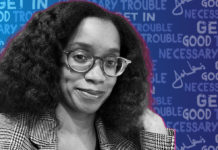What do we really want? Each day, it becomes less clear. Regardless of views and beliefs, teachers say they want more respect for their profession. However, the way some educators treat each other does not tend to align with the values they claim to have.
A few years back, a STEM conference was advertised by an educator who promotes STEM activities with her husband. Black educators, including me, called out the fact that the panel lacked diversity.
We know how this goes. A white educator makes comments or takes actions that other educators of color find problematic. The pile-on of rebuke comes from educators of color and some white educators jump on the bandwagon. Then, the white educator who does the offense doubles down on their actions. The educators who called them out turn up the dragging. Next, the white educator who did the offense relents and apologizes. (I am aware that some do not apologize and this piece will not address them.) It is what happens after the apology that bothers me.
Episode 42 of my podcast Brazen Education was titled “How to Move Forward When Making a Mistake with Diversity, Equity & Inclusion.” My guests were Carly and Adam Speicher and Dr. Elondra D. Napper. Carly and Adam are the couple I mentioned above who were behind the STEM conference. Dr. Napper was a Black educator who joined forces with them after they revamped their conference. I thought this was a strong episode to explain how to move forward when you get called out. That episode was not received well by all.
Damn it! What do we want? Do we want people to change, or do we want to keep dragging them on the internet?
I was accused of giving white people a pass and turning my back on Black educators. Damn it! What do we want? Do we want people to change, or do we want to keep dragging them on the internet?
These questions popped into my mind again after I saw a white teacher dragged over her commentary of the new show “Abbott Elementary.” Teacher Rachel Platt shared a now-deleted video on TikTok criticizing “Abbott Elementary,” a sitcom about a fictional urban school. The video begins with Platt saying, “I’m a real-life elementary school teacher, and I watched this week’s episode of ‘Abbott Elementary’ so you don’t have to.”
People were quick to point out that the show is a mockumentary and is not supposed to be completely accurate.
Other people questioned whether she disliked the show because of the mostly Black cast.
Later, Platt posted an apology video where she acknowledged comments received by Black educators and that she wanted to “center Black voices.” She explained that she now knows and understands why Black educators were upset. She apologized for invalidating Black teachers’ experiences. Platt shared she was advised on how to craft her apology. She closed with “I’m planning to donate my January creator fund to Black educators who are dedicated to calling out the inherent biases of white liberal teachers like myself.”
Despite these efforts, it was not still good enough for some.
It is not lost on me that some people apologize to simply get the heat off of them, and they do not mean it. But at some point, we have to give white educators, who we call out, an opportunity to show that they have changed through their actions. If their actions continue to not align with their apology, then we can circle back.
Black educators cannot claim they want white teachers to change and then do not let them have the opportunity to apologize and change their actions.
Black educators cannot claim they want white teachers to change and then not let them have the opportunity to apologize and change their actions.
Honestly, I love Quinta Brunson, the actress and creator behind “Abbott Elementary,” but I have yet to watch the show. Frankly, I have avoided shows about teachers because I don’t want to be in school all day and watch school at home—even if it is funny.
Y’all going to drag me for not watching yet?
I want us to get to the point where restoration is the aim, and we get beyond picking apart these apologies. The apologies are a necessary part of restoration, but I’m looking for the action. For example, There were a lot of organizations that had panels with all Black guests for the Dr. King holiday. That was great, but I am looking to see if these same organizations are able to find Black people for panels during the rest of the year.
People have to be given the opportunity to grow and change. Honestly, we all should put less time into social media and more time into getting the work done.










